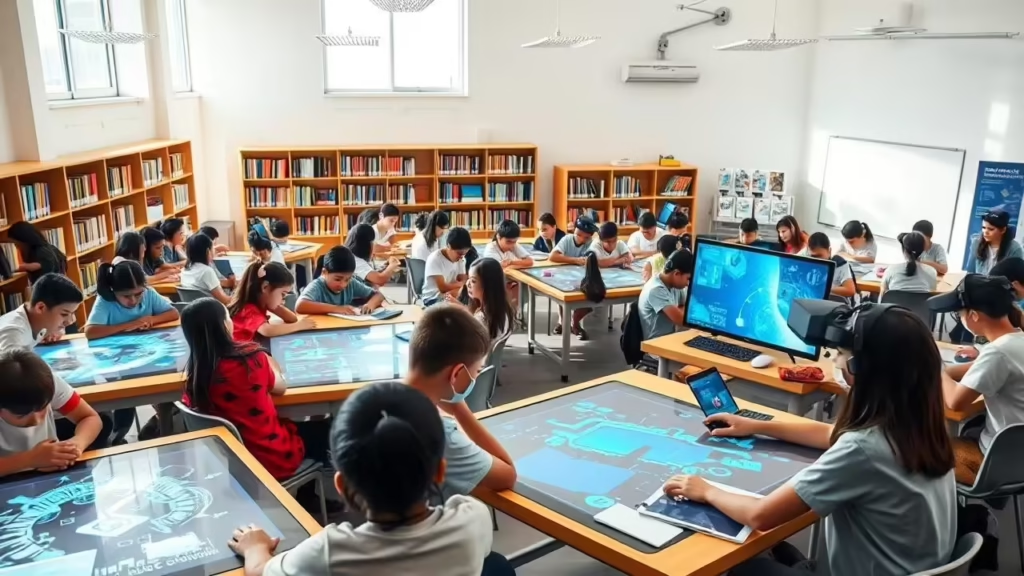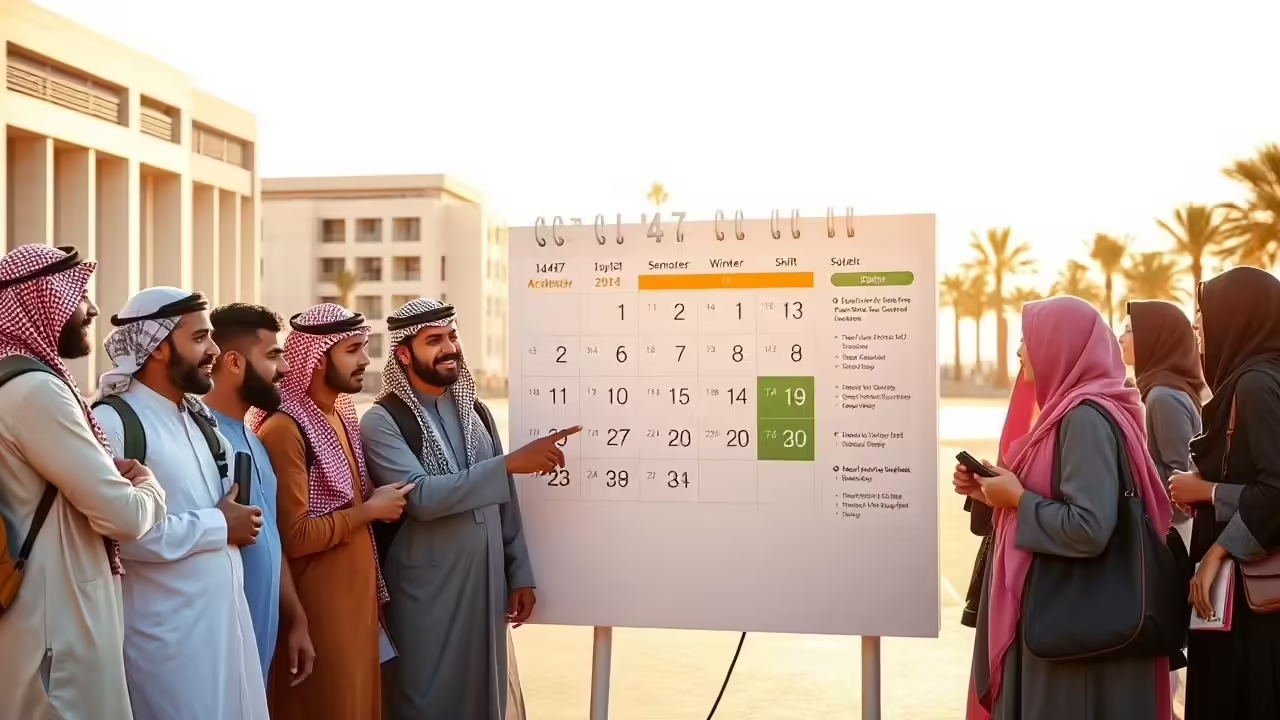New Beginnings for Saudi Education
Saudi Arabia is preparing for another transformative academic year with the official announcement of the 2025-2026 academic calendar, bringing forward new schedules, holiday breaks, and winter timings designed to create a more balanced and enriching learning experience. The new calendar not only reflects the Kingdom’s commitment to enhancing the education sector but also aligns with Vision 2030’s broader goals to modernize and optimize student well-being and productivity.
The changes highlight Saudi Arabia’s continuous efforts to improve academic planning, reduce burnout, and introduce more family-friendly holidays for both students and teachers. This update is seen as a progressive step forward in adapting to new educational trends and lifestyle needs in the region.
Academic Year Structure and Key Terms
The 2025-26 academic year in Saudi Arabia will follow the well-structured three-term system, a format that has proven successful in balancing study periods with rest intervals. Each term will include distinct learning modules, examination schedules, and carefully planned holidays.
The first term is expected to begin in late August 2025, welcoming students across public and private schools as well as universities. It will focus on core academic subjects and project-based learning, allowing students to adjust to the new winter schedule.
The second term, commencing in December 2025, will take advantage of the cooler climate, incorporating practical learning and outdoor activities under the new winter timings.
Finally, the third term, beginning in April 2026, will guide students toward the end-of-year evaluations and summer preparations.
The Ministry of Education has emphasized that this structure encourages consistency, reduces academic stress, and gives educators ample opportunity to innovate within the curriculum.
Introduction of New Winter Timings
One of the most talked-about changes in the upcoming academic year is the introduction of new winter school timings, aimed at ensuring comfort and better attendance during colder months.
Under the new guidelines, schools will start slightly later in the morning, giving students more time to adjust to cooler weather conditions and helping parents manage morning routines more efficiently. Classes are expected to begin at 8:00 AM instead of 7:00 AM, with adjustments depending on regional temperatures.
This change, though seemingly minor, holds significant benefits. Students in northern and central regions, where mornings can be particularly chilly, will enjoy safer and more comfortable commutes. The move is also expected to enhance classroom focus, as studies have shown that a later start time can improve concentration and academic performance.
Teachers have also welcomed this decision, noting that the adjustment reflects a thoughtful approach to student welfare and teacher convenience alike.

Balanced Breaks and Extended Holidays
The 2025-26 calendar promises well-distributed holidays that maintain the balance between academic rigor and personal rejuvenation. Each term will include a major break along with shorter rest periods to help students and educators recharge.
The first term break will likely occur in mid-November 2025, serving as a short rest after the initial months of intense learning.
The mid-year break, one of the most anticipated holidays, will begin in late January 2026, coinciding with the winter season. This extended vacation will allow families to travel, engage in recreational activities, and celebrate cultural events.
The Eid al-Fitr holiday, falling around March or April 2026, will bring a festive pause to the academic calendar, followed by the Eid al-Adha break during the summer term.
Each of these intervals is strategically placed to reduce academic fatigue and maintain motivation throughout the school year.
Emphasis on Well-Being and Family Life
The Ministry’s adjustments highlight a growing focus on mental health, family time, and overall well-being, values that have gained importance in modern educational policy. By reintroducing flexible timing and balanced holidays, the Saudi education system is aligning more closely with international standards that prioritize holistic development over rigid routines.
Parents have responded positively, particularly those with young children who find early winter mornings challenging. The later start not only reduces stress but also ensures students get sufficient rest before their school day begins.
This renewed emphasis on wellness reflects Saudi Arabia’s vision of nurturing not only academic excellence but also healthy, well-rounded citizens ready to contribute positively to society.
Encouraging Innovation and Flexibility
The 2025-26 academic calendar isn’t just about timing; it’s also a symbol of flexibility and innovation. The Ministry has given schools greater autonomy to integrate digital learning, hybrid modules, and extracurricular programs that reflect local community needs.
Educators are encouraged to implement modern teaching practices, blending in-class instruction with interactive digital platforms to prepare students for the future economy. This adaptability also ensures that learning continues seamlessly in the event of unforeseen disruptions such as extreme weather or national events.
Furthermore, weekend enrichment programs and community projects are being incorporated into the school calendar, giving students a chance to apply their knowledge in real-world contexts while nurturing leadership and teamwork.

Alignment with Vision 2030
Every educational reform in the Kingdom draws inspiration from Vision 2030, and the academic calendar for 2025-26 is no exception. The goal is to create an education system that balances academic excellence with creativity, innovation, and well-being.
The structured breaks and seasonal adjustments promote a sustainable educational rhythm, allowing students to engage deeply with their studies without feeling overwhelmed. Additionally, by introducing changes that cater to regional climates and modern family lifestyles, Saudi Arabia continues to strengthen its position as a regional leader in education reform.
These strategic updates are a reminder that the Kingdom’s vision for the future extends beyond economic diversification; it’s also about nurturing the next generation of thinkers, creators, and leaders.
Teacher Development and Professional Growth
Teachers remain at the heart of Saudi Arabia’s educational transformation. The 2025-26 academic year includes enhanced provisions for teacher training and development, ensuring educators are well-prepared to adapt to the evolving academic environment.
Professional development sessions will be scheduled during mid-term breaks, providing teachers with opportunities to explore new methodologies, technology integration, and student engagement techniques. The Ministry is also focusing on collaboration between schools and universities to strengthen research-driven teaching.
By investing in educators, the Ministry is fostering a culture of continuous learning that directly benefits students and raises the overall standard of education across the country.
Digital Integration and Smart Learning
Another major highlight of the upcoming academic year is the continued integration of smart learning technologies. After the successful digital initiatives of previous years, the Ministry aims to expand access to e-learning resources, particularly for remote and rural schools.
Interactive platforms, AI-assisted study tools, and online assessment systems will form part of the new academic infrastructure. These innovations are designed to make learning more engaging, personalized, and efficient, reflecting global trends in digital education.
Students will also benefit from flexible access to course materials, enabling self-paced learning and improved academic independence. As Saudi Arabia continues to embrace digital transformation, this approach ensures inclusivity and accessibility for all learners.
Community Engagement and Student Activities
In addition to academics, the 2025-26 calendar emphasizes student participation in extracurricular activities, cultural festivals, and community events. Schools will have dedicated weeks for science fairs, sports tournaments, and arts showcases, fostering a sense of creativity and teamwork.
The Ministry has also highlighted the importance of volunteerism and civic engagement, encouraging students to contribute to environmental, social, and humanitarian projects. Such initiatives build empathy, leadership, and social responsibility, key traits for the future generation envisioned by Vision 2030.
These community-focused elements transform schools into centers of cultural and social growth, nurturing talents beyond the classroom.
Parents’ Role in the New Schedule
With the new timings and calendar structure, parents will play an increasingly active role in managing their children’s educational routines. The later winter start allows families to coordinate schedules more comfortably, especially in households with multiple school-going children.
The Ministry has also enhanced communication between schools and families, introducing digital parent portals that provide updates on attendance, performance, and upcoming events. This transparency fosters trust and collaboration between educators and parents, ensuring a more supportive academic journey for every child.
Parents have been encouraged to use the holiday periods to engage their children in educational travel, reading, and practical life experiences, promoting a culture of lifelong learning beyond school walls.
Anticipation and Readiness for Change
As the education community prepares for the 2025-26 academic year, anticipation and optimism are running high. Schools are adjusting schedules, updating facilities, and aligning curricula with the new structure.
Students are equally excited about the more flexible routine and the promise of a smoother balance between studies and rest. Many view the upcoming year as an opportunity to grow academically and personally within a system that values their time and comfort.
The Ministry’s approach to planning, rooted in consultation, data analysis, and feedback from educators, ensures that the implementation will be both smooth and effective.
Looking Ahead: A Vision of Progress
The Saudi academic calendar for 2025-26 is more than a schedule; it represents a strategic blueprint for progress. By integrating modern learning methods, thoughtful holiday planning, and student-centric timings, the Kingdom continues to set new standards for educational excellence in the region.
With a focus on balance, innovation, and community well-being, Saudi Arabia is building an educational ecosystem that empowers both students and teachers. The new calendar reinforces the Kingdom’s mission to nurture a generation that is not only academically strong but also mentally resilient, socially aware, and ready to shape the nation’s future.
As the new school year approaches, the spirit of renewal and ambition will fill classrooms across the country, marking yet another milestone in Saudi Arabia’s inspiring journey toward educational transformation.
Do follow Gulf Magazine on Instagram.
Also Read – Gulf Nations Unite to Launch Powerful Arabic AI Revolution



